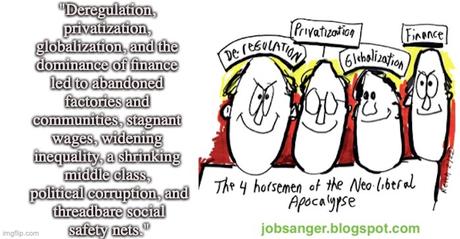
For about three decades after World War II, the United States had a fair economy. Rising productivity was shared, unions were strong, and the middle class was growing. Then, about 1980, the Republicans gained enough power to change economic policy. Their "trickle-down" policy rewarded the rich at the expense of everyone else -- creating an economy that's currently more unfair than that of many third world countries.
Here is part of how Robert Reich described it:
Even before the pandemic, more than one out of every six America children was impoverished, often without enough food or inadequate shelter. Meanwhile, the typical American family was living precariously from paycheck to paycheck. At the same time, a record high share of national wealth was already surging to the top.
Starting last July, the nation did an experiment that might have limited these extremes. That’s when 36 million American families began receiving monthly payments of up to $3000 per child ($3,600 for each child under 6).
Presto. Child poverty dropped by at least a third, and the typical family gained some breathing space.
It’s rare for a government policy to work so unambiguously well, so quickly, on such a huge scale, and on so basic a problem.
The experiment ended abruptly in December, notwithstanding.
On Dec. 19, as you may recall, Senator Joe Manchin announced he would not vote for President Biden’s Build Back Better Act, which would have continued the monthly payments. He cited concerns over the ballooning federal budget, and offered to support a smaller version without the child subsidy. Not a single Republican senator would vote for it either, citing similar concerns. That, it seems, was the end.
But obviously, the federal budget would not balloon if taxes were raised on the rich and on big corporations to pay for the child subsidy -- at a cost of an estimated $100 billion per year, or $1.6 trillion over ten years.
That’s less than big corporations and the rich will have saved on taxes from the Trump Republican tax cut. Repeal it, and there’d be adequate money.
It’s also less than the increase in the wealth of America’s 745 billionaires since the pandemic began. Why not a wealth tax?
It’s also less than one-seventh of America’s bloated defense budget. Arguably, America would be stronger in future years if fewer American children are impoverished and the typical family more financially secure.
The experiment died because, put simply, big corporations and the super-rich didn’t want to pay for it.
Capitalism and democracy can co-exist as long as democracy is in the driver’s seat -- reducing the inequalities, insecurities, joblessness, and poverty that accompany unbridled profit-seeking.
For the first three decades after World War II, democracy was in the driver’s seat. Both the US and war-ravaged Western Europe built the largest middle classes the world had ever seen, and the largest and most buoyant democracies. The arrangement was far from perfect, but with addition of civil rights and voting rights, subsidized health care (in the US, Medicare and Medicaid), and a huge expansion of public education, democracy was on the way to making capitalism work for the vast majority.
Then came a giant U-turn, courtesy of Ronald Reagan in America and Margaret Thatcher in Europe. Deregulation, privatization, globalization, and the dominance of finance led to the Full Monty: abandoned factories and communities, stagnant wages, widening inequality, a shrinking middle class, political corruption, and threadbare social safety nets.
The result? Widespread anger, frustration, and cynicism. Even before the pandemic, most people were working harder than ever but couldn’t get ahead, and their children’s prospects weren’t any better. The lion’s share of economic gains went to the top.
As Americans went to the polls after eight years of President Obama, 75 percent said they were looking for a leader who would “take the country back from the rich and powerful.” Donald Trump campaigned as the voice of the working class but he delivered the country more fully into the hands of the rich and powerful by stoking racist nationalism.
Racist nationalism marks the ultimate failure of progressive politics. When the people are no longer defended against the powerful, they look elsewhere. This was the direct legacy of forty years of deregulation, privatization, globalization, and the dominance of finance. It explains what happened in 2016 — and may happen again in the mid-term elections of 2022 and the presidential contest of 2024.

